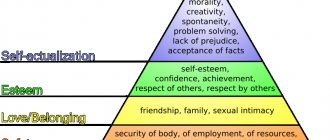For most people who are not familiar with NLP, this combination of letters is associated with hypnosis, manipulation of consciousness, and zombification. In fact, neurolinguistic programming? it is just a technology for setting and achieving goals, a way of learning something new and enjoying life.
Show/Hide text
WikiReference: Presuppositions in NLP are axiomatic beliefs used as a tool to facilitate the achievement of the desired effects from techniques.
Nowadays, many people study NLP, receive certificates as practitioners and masters, and they do this, first of all, in order to make their own lives more harmonious and happy. The philosophy of NLP is based on several main presuppositions, axioms, universal rules of perception and interaction with this world and the people around us. Even if you are not going to study NLP, knowledge of these basic rules can help him understand the world and himself better, and, therefore, become more successful and happier.
You need to reach deep thoughts. Stanislav Jerzy Lec
So, here they are, the basic presuppositions of NLP:
The map is not the territory
How a person perceives the world around him and what this world really is? two different things. Everything is subjective.
If we think we know something or someone, then in reality we only know our personal idea of that thing or person. Here, for example, is our good friend. We are convinced that we know him very well, that he is a wonderful person. And suddenly we find out that he committed a terrible act. Often we simply refuse to believe it, saying to ourselves: “How could I be so wrong?”
If the map is not the territory, then we always remember that we can make mistakes and draw hasty conclusions. In order to understand this world better, and to always be ready for changes, we try not to judge categorically and constantly observe, receive maximum objective information about the outside world, on the basis of which we can then try to draw conclusions.
Sherlock Holmes followed this principle: while the police and Dr. Watson were making assumptions on the basis of which they committed rash actions, Holmes collected maximum objective information. Therefore, his “map” was most often one-to-one similar to reality.
What are NLP presuppositions?
In fact, presuppositions in neurolinguistic programming are axioms
, which followers of NLP techniques use to effectively use other tools, form their worldview and views on a particular issue.
The value of presuppositions lies not in their truthfulness
(exact correspondence with objective reality), but in the fact that a person following such attitudes will perform the tasks facing him
faster and more efficiently
.
In other words, presupposition is not the ultimate truth. Rather, it is an assumption, a useful idea
that allows you to look at the situation differently, find a solution to the problem, get out of the conflict (or even not enter into it), etc.
Many of us use NLP techniques in our daily lives. For example, before a date/important meeting, some people tell their reflection in the mirror: “You can handle everything, baby” or “You look amazing, handsome.” Presuppositions can also be very useful
. Below we will look at the most interesting of them and how they are used.
Consciousness and body are parts of a single cybernetic system
Our body and mind are inextricably linked. If we imagine a certain sensation well, we will soon experience it. The condition of our body depends 80 percent on what we think about it.
Example
For example, a person who concentrates on pain suffers, and when distracted from it, he seems to forget about its existence. Even in the case of a serious illness, imagining your recovery and good health allows you to recover much faster.
Exactly, ? imagining yourself being able to move, ? NLP founder Milton Erickson rose from a wheelchair after suffering from polio.
The meaning of a message is the behavioral response it evokes.
The main goal of any speech is to change behavior.
If we say something, or are told something, this is not done in order to convey information, but with the aim of inducing some kind of action. Directly or indirectly.
For example, if we want a child to wash his hands before eating, we can tell him directly: “Go and wash your hands!”, or we can tell him about the dangerous germs that crawl on his hands. Then the child will run to the bathroom himself. In any case, the ultimate goal of our speech will be his behavior. It follows from this that before communication it is always necessary to set a specific goal - what behavior we want to achieve from a person. If there are no specific goals yet, then the goal should at least be to form a good attitude and trust in us. So that later it will be easier to achieve your goal.
Data transfer forms
How does a person obtain the necessary information? There are three forms that are used to transmit data:
- Verbal. It is used during conversations and lectures.
- Visual. This form of communication is a visual demonstration of the methods of applying presuppositions.
- Full immersion. In this case, the person literally lives the presupposition.
Which form of information transfer should I choose? This will depend on the person, because people perceive and process the data received in completely different ways. And it depends on the dominant channel - visual, kinesthetic or auditory. In addition, the nature of such information may also vary. The dominance of one of the channels leads to filtering of the senses. In other words, what some hear may not be felt or seen by others. In this regard, an important condition for the effectiveness of NLP practice is the orientation towards the channel of perception that is dominant, which indicates the existence of auditory, visual and kinesthetic learners. These psychological characteristics must also be taken into account by those people who want to use NLP presuppositions to manage their own lives.
You can determine a person’s dominant perception system if you carefully study the characteristics of his speech and behavior. Thus, visual learners focus mainly on visual images. The main importance for them is the color, size and shape of objects. Such people value the orderliness of things and the harmony of the surrounding space. That is why they are annoyed, for example, by clothes lying out of place or a book that has not been put back on the shelf.
Kinesthetics live by the sensations of the body. The most important thing for them is the sense of movement, tactile perception, the comfort of a sofa or the speed of a car. What matters in this case is not the color of the item, but its convenience. That is why kinesthetic people will become very irritated by a tight collar or cookie crumbs left by someone in bed.
Auditory learners perceive the world around them as a combination of sounds. That is why it is easier for them to remember information by ear.
There are no mistakes, only feedback
If you did something and it didn't work out, it doesn't mean you lost. This means that you have eliminated one of the wrong options from the ways to achieve your goal, thereby getting closer to the result.
Example
Imagine that you were given a gun and 10 rounds of ammunition. Your goal is to hit the target. You aim exactly at the center of the target and shoot, but the bullet hits a few centimeters to the left of the target. What are you doing? You just move the sight to the right and hit the target the second time.
The main quality of a successful person is the understanding that failures correct the path to the goal . Therefore, if something doesn’t work out, try to do it in a new way, analyzing the experience of the previous action, and very soon you will achieve your goal.
Types of NLP presuppositions
Different authors identify different settings that they consider basic. The lists of basic presuppositions compiled by R. Bandler, R. Dilts, S. Andreas and other researchers do not coincide in everything, but they are invariably associated with one of the following categories, and may combine two or even all three parameters:
- efficiency
– achieving the goal with the most successful results; - permission
– the right or opportunity to perform an action; - ecology
– acceptability of consequences.
Positive intention underlies all behavior
Whatever a person does, he does it in order to achieve something, to get something.
From an NLP perspective, action always has a purpose. This means that if you do not understand a person’s behavior, then, first of all, you must think about what he wants to achieve for himself. It is very important to understand that, in the end, a person achieves something exclusively for himself. Even holy people who selflessly help the suffering do this to save their own souls.
By the way, compliance with this rule is the best protection against all kinds of manipulation, fraud and deception. If you constantly ask yourself the question: “Why is he offering me this (saying, convincing)? How is this beneficial for him?”, then it becomes much more difficult to deceive you.
Statements about learning, choice, and change
Examples of postulates of the following type of presuppositions are:
- People have internal resources that will allow them to achieve their intended goal. The creators of NLP believe that every person has innate abilities to overcome difficulties. In order to discover their own resources, people need some help. For example, a person may need special training or additional education to achieve success.
- The human body works as a bioelectrochemical device that processes information. This allows us to learn quickly. For example, a child accidentally falls into a pool filled with water. As he grows up, he may not forget this incident. Then he will remain afraid. Its intense or inappropriate manifestations can occur both when thinking about bathing and when looking at water.
Any behavior represents a choice of the best option from available
This NLP presupposition seems to continue the commandment of Christ: judge not, lest ye be judged.
If you see a person who is doing something that you think is wrong, it does not mean that he is stupid, just that he is doing what is the best choice in his situation.
If we forget about this rule, then instead of understanding the situation, we begin to give meaningless advice.
Example
Imagine that you see a person pushing a car in front of him. We approach him and ask why he can’t just get in the car and drive. The man tells us that his car is broken. This is, of course, a simplified example, but it often happens that we judge a person’s behavior from outside his situation, from the outside.
It is free choice that creates personality. To be means to choose yourself. Albert Camus
Pivot table
| Strategy | Operating principle | Constructions | Examples |
| Assumptions | Linking the desired outcome to what is happening or about to happen. | as soon as, after; immediately as; if, then; When; before; | - As soon as you sit on the chair, you will feel better. - Before you leave the house, call me... |
| Oppositions | Linking the desired action to a process that is happening or will definitely happen. | than... how much... so much | - The faster you fall asleep, the better sleep you will have. - The more time you spend studying, the better you will know this subject. |
| Questions | Shifting attention to the circumstances of the action | why why for what how when where | -Where are we going to have lunch today? - Why do you love me? - When will you repay the debt? |
| Predicates of awareness | Shifting the focus of attention to awareness. | realize notice pay attention why how where | - Do you already understand that you are doing everything better and better every time? — How did you become so successful? |
| Subsequence | Shifting the focus to the order of steps | first second next previous first then after that | -What will be your first step? -Where will you go next? - Who wants to speak next? |
| Grade | Shifting the focus to an external assessment of the situation. | like curious annoying important doubt amazed admire hate | — It is important that you understand everything. — I’m curious: how do you manage to do everything? “Everyone is annoyed by your ability to dress well.” — The military is amazed by the sudden invasion of aliens! |
| Changes over time | Shifting the focus to the development of the process over time. | start continue finish so far already still still | —Have you started paying attention to presuppositions? - Keep up the good work. -Have you learned everything yet? — This topic is even more interesting. |
| False elections | Shifting the focus of attention to the circumstances of the action. | or both... and | — Do you want to buy a washing machine or refrigerator? - You can call me either today or tomorrow morning. |











